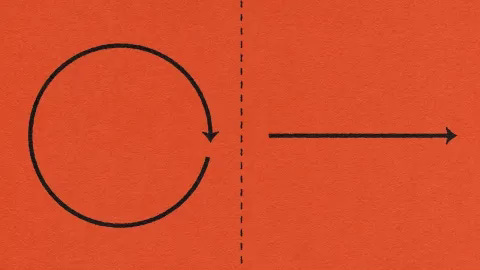If you like what you read, copy and share the link, post it on another platform.
Please also subscribe to make sure you will not miss future posts. Subscription is free. Your email will not be used for other purposes. You will receive no advertisements.
-+-+-+-+
An image posted by Melis Ugurlu on different perceptions of time inspired me to write this essay on how we might extend our subjective experience of life.
Ancient Greeks perceived time as circular. For Plato, time was a repetitive loop, created simultaneously with the heavens and following the harmonious motion of the celestial bodies. There was no "End of Days" in Plato's conception—no final judgment or apocalypse. Time simply continued its eternal cycles.
In contrast, the modern era, influenced by Judeo-Christian narratives, reimagined time as a finite linear trajectory with a clear origin (Creation) and an ultimate end (Apocalypse).
How We Experience Time Throughout Life
Reading Melis Ugurlu's essay reminded me how our concept of time changes through subjective experience. Understanding this shift might be the key to living practically forever—at least in our perception.
Our subjective timeline begins at birth. Events before our date of birth occupy a different mental category. When I was twenty, an event that occurred even just a year before my birth seemed like ancient history. Now at seventy, something from twenty-one years ago feels like recent times.
The Circular Years of Youth
Along the timeline that started with my birth, early life mirrored Plato's cycles. School years looped predictably, then blended seamlessly into work, family, and career routines, each providing reassuring continuity.
I believe we all share this experience. At the beginning, we perceive time in the Platonic sense—a circular progression from one school year to the next, from primary school to high school, then to university for some of us. We move seamlessly from one loop to the next.
Death from old age is a theoretical certainty, yet it feels so distant that it rarely enters our daily thoughts.
The Loops Continue
Some of us get married and repeat these same loops with our children, from one school year to the next, from primary school to high school, creating a new layer of cycles that overlap with our own.
Even after children leave home, work provides structure—a series of deadlines and repetitive sequences that give us our sense of time. Around this period, we start noticing our age and become aware of our frailties, but we remain preoccupied with the demands of our current loops.
The Great Disruption: Retirement
Retirement disrupts this rhythm, turning circular time abruptly linear. Unless we take deliberate action, our timeline becomes an arrow that moves in only one direction—toward an end we can no longer ignore.
How to Live Forever
If you want to "live forever" as promised in the title, you must bend this line back into circles, as it used to be when you were young. This requires intention and commitment:
Take on new projects
Enter new commitments
Make substantive plans for the future
I'm not talking about casual hobbies or effortless pastimes like fishing or golf on Sundays. These create only little ripples on the straight line that keeps moving inexorably forward. Instead, you need substantive loops that leave a mark and require genuine commitment.
Don't be afraid of making commitments that structure your time:
A project to complete by next Sunday
Another for the summer
One more to finish by this time next year
Perhaps an ambitious endeavor that might take a decade
The Philosophy of Subjective Immortality
Working toward your goals with the same timeless circular commitment you once applied to your career or family creates a profound shift in your perception of time. This shift is what allows you to "live forever" within your subjective experience.
Does it matter that the loop will eventually break and the line will end? After that point, it doesn't matter anyway. Life will return to how it was in the millions of years before you were born, before your subjective time began.
Every one of us has our own timeline, and within that timeline, we can all strive to be immortals. What happens beyond it is of no consequence to our lived experience. By creating meaningful cycles that engage our full attention and commitment, we bend time back to the circular pattern of our youth—and in doing so, we transcend its linear limitations.

I really like "bending the line back into circles," or at least an ellipse? My biggest struggle though has always been planning long-term. I think I have an inherent, very profound belief that I'm not in control of anything in life so therefore I should not even attempt to think about a point of time in the future. The monthly and yearly section of my planners are usually unused, while I passionately scribble notes and tasks and to-do's in the "weekly."
I'd love to hear any tips you have for the shift of perception or habits required for this!!
Also thank you so much for mentioning my essay, I'm really happy that it could spark thoughts!!